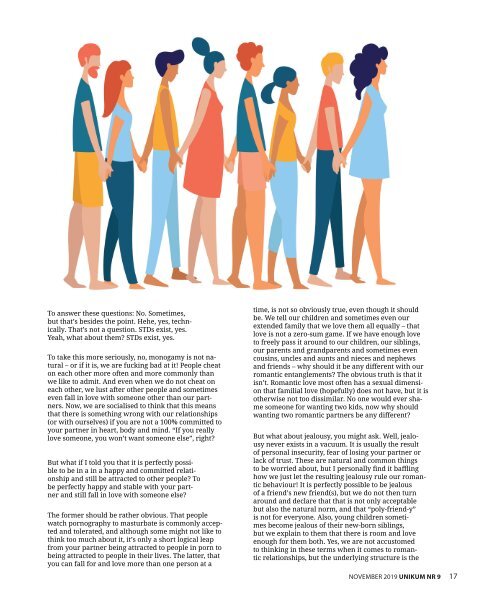Create successful ePaper yourself
Turn your PDF publications into a flip-book with our unique Google optimized e-Paper software.
To answer these questions: No. Sometimes,<br />
but that’s besides the point. Hehe, yes, technically.<br />
That’s not a question. STDs exist, yes.<br />
Yeah, what about them? STDs exist, yes.<br />
To take this more seriously, no, monogamy is not natural<br />
– or if it is, we are fucking bad at it! People cheat<br />
on each other more often and more commonly than<br />
we like to admit. And even when we do not cheat on<br />
each other, we lust after other people and sometimes<br />
even fall in love with someone other than our partners.<br />
Now, we are socialised to think that this means<br />
that there is something wrong with our relationships<br />
(or with ourselves) if you are not a 100% committed to<br />
your partner in heart, body and mind. “If you really<br />
love someone, you won’t want someone else”, right?<br />
But what if I told you that it is perfectly possible<br />
to be in a in a happy and committed relationship<br />
and still be attracted to other people? To<br />
be perfectly happy and stable with your partner<br />
and still fall in love with someone else?<br />
The former should be rather obvious. That people<br />
watch pornography to masturbate is commonly accepted<br />
and tolerated, and although some might not like to<br />
think too much about it, it’s only a short logical leap<br />
from your partner being attracted to people in porn to<br />
being attracted to people in their lives. The latter, that<br />
you can fall for and love more than one person at a<br />
time, is not so obviously true, even though it should<br />
be. We tell our children and sometimes even our<br />
extended family that we love them all equally – that<br />
love is not a zero-sum game. If we have enough love<br />
to freely pass it around to our children, our siblings,<br />
our parents and grandparents and sometimes even<br />
cousins, uncles and aunts and nieces and nephews<br />
and friends – why should it be any different with our<br />
romantic entanglements? The obvious truth is that it<br />
isn’t. Romantic love most often has a sexual dimension<br />
that familial love (hopefully) does not have, but it is<br />
otherwise not too dissimilar. No one would ever shame<br />
someone for wanting two kids, now why should<br />
wanting two romantic partners be any different?<br />
But what about jealousy, you might ask. Well, jealousy<br />
never exists in a vacuum. It is usually the result<br />
of personal insecurity, fear of losing your partner or<br />
lack of trust. These are natural and common things<br />
to be worried about, but I personally find it baffling<br />
how we just let the resulting jealousy rule our romantic<br />
behaviour! It is perfectly possible to be jealous<br />
of a friend’s new friend(s), but we do not then turn<br />
around and declare that that is not only acceptable<br />
but also the natural norm, and that “poly-friend-y”<br />
is not for everyone. Also, young children sometimes<br />
become jealous of their new-born siblings,<br />
but we explain to them that there is room and love<br />
enough for them both. Yes, we are not accustomed<br />
to thinking in these terms when it comes to romantic<br />
relationships, but the underlying structure is the<br />
NOVEMBER <strong>2019</strong> UNIKUM NR 9 17


















